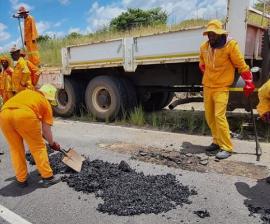
Transport Minister Barbara Creecy says although the transport sector faces challenges, the department remains committed to fulfil its mandate to the people of South Africa.
“Given the current status of the transport sector, my first task in this 7th Administration is to stabilise the transport system in our country and make our department fit to fulfil its policy-making and regulatory role,” the Minister said when tabling the department’s Budget Vote at Parliament’s Portfolio Committee on Transport on Monday.
Challenges in the department
Creecy said the department has become “disconnected” from its vision to lead the development of efficient and integrated transport systems.
“[Today], we would all agree that an efficient and functioning transport sector that moves people and goods safely, speedily and affordably across the length and breadth of our country is the key to a successful economy.
“In recent times, there has been a disconnect between this vision and the realities of our transport system and our national Transport Department. Our sector is not operating as either an effective economic facilitator or as a much-needed social service,” she said.
Furthermore, she noted that the department has faced myriad challenges, including the COVID-19 pandemic that affected the freight system, with long delays in the “movement of key bulk minerals, containers and vehicles”.
“Dysfunctional port terminals resulted in long waiting times for ships wishing to berth, as well as congestion at strategic border crossings and key national highway corridors. Our freight rail system was characterised by maintenance backlogs, cable theft, and skills shortages.
“Our road systems deteriorated throughout the country and many provinces failed to execute maintenance and new build programmes, resulting in unspent funds being returned to National Treasury,” she said.
Creecy said the establishment of the National Logistics Crisis Committee (NLCC) was a response to meet the scale of the crisis is critical.
“The NLCC has three distinct objectives: improving operational performance of industry supply chains, including freight rail and ports; implementing reforms to modernise the freight transport system for efficiency and competitiveness, and necessary regulatory change or exemptions to enable efficient procurement and adequate funding for network maintenance,” she said.
Turning to the work of the Passenger Rail Agency of South Africa (PRASA), the Minister said despite facing challenges of infrastructure damage and cable theft, the agency continues to reopen passenger rail lines, with 28 of 40 priority lines being fully operational.
“As of March this year, 256 stations are fully functional in cities across the country.
“Continuous work is being done to rehabilitate and open more strategic commuter corridors. This will ensure that the public can rely on safe, secure, punctual, and affordable public rail services that will not hinder their participation in the economy,” she said.
Stabilising the department
Creecy told the committee that a key priority for this financial year is stabilising and improving “governance of the department and its entities”, with critical vacancies to be assessed and filled.
“The efficacy of the department’s entities in fulfilling their stated mandates will also be assessed, and reforms such as addressing adverse audit findings and the timeous payment of outstanding invoices will be implemented.
“Immediate attention will be given to the critical issue of underspending by both departmental entities and Provincial Departments on finances allocated for road maintenance and road construction. In a country where citizens must daily navigate the hazards of potholes, it is unconscionable that we are returning money to National Treasury,” she insisted. – SAnews.gov.za


